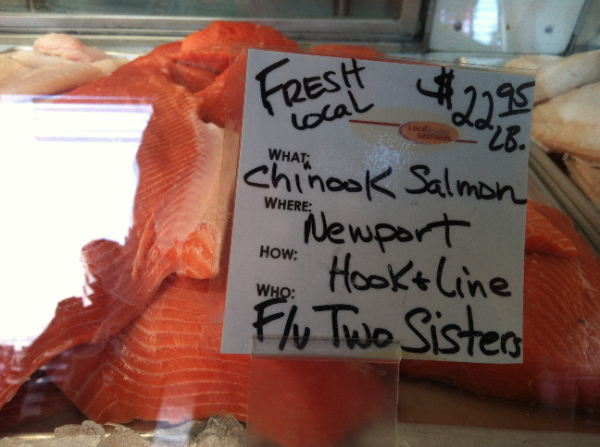During a recent trip to Oregon, our journey took us to a dockside seafood restaurant in Newport.
As you can see from the photo below, this restaurant offers fresh local seafood in addition to meals made with the local catch. Print readers, see http://www.flatheadbeacon.com/images/uploads/freshlocalsalmon.jpg

Take another look at the sign used to describe this salmon.
We know that the fish was caught locally by a real person who had to reel it in, on fishing vessel (“F/V”) that employs local people. The sign tells us it wasn’t farmed, pitched into a freezer with 30,000 other fish, much less frozen and shipped in by truck or rail from 1,000 miles away.
The sign’s details drive home that this slab of salmon is fresher and (probably) better than salmon in the chain grocery down the street that has a sign saying “fresh salmon”. You know details about this particular fish’s path to the refrigerated case that you rarely know in an ordinary grocery store that doesn’t really specialize in seafood.
I’ll bet that if I had asked the lady behind the counter about Two Sisters, she could have told me about them.
Fresh and local is a particularly critical for fish and produce, but the effort to describe whatever you do in rich, honest detail is critical – particularly if you’re selling against commoditized products and services that tend to be compared solely by price. The goal isn’t to be flowery and cover up what you do with fancy wallpaper – it’s to help someone who cares understand why your stuff is what they really want.
Your why is just one more thing that makes you stand out because it resonates with what’s deeply important to discerning buyers.
What about what I do?
Emphasizing the upside of using local food should be an obvious win, but this sort of thing is no different for those who sell furniture, vacuum cleaners or whatever it is that you sell.
If I talk to your staff or visit your website, am I going to get why you sell what you sell, vs just selling any old thing? Do I get a feel for what’s important to YOU when you choose (or manufacture) a product, or deliver a service? Do I know what drove you to offer these services and why it might be more important to you than to me that you “fix” whatever issue my life, business or vehicle has?
I spent about 20 minutes listening to a vacuum guy compare different units for me the other day. I’m bad about listening to salespeople whether I plan to buy that day or not, because I want to hear and assess their pitch.
I got good info about the results, lifespan and repair expectations I could expect when choosing between different types / brands / quality levels of vacuums (all important stuff). I didn’t get much about why it was important to him that I make the right choice. Yet I got exactly that from someone about 30-40 years his junior – his son.
Enthusiasts
You all know an enthusiast, and you probably are one about something. Enthusiasts will explain why you might value certain things or experiences as much as they do, either to bring you into the fold or just to explain why they care.
Coffee people will explain why a burr is superior to a grinder. People who are into furniture will ask it is built using eight way hand tied springs. Skiers and snowboarders will wax on about tuning and wax.
Those things matter to enthusiasts who don’t want their beans scorched, crave holding an edge in the steeps, and want a repairable couch that will sit as nicely in 25 years as it does today. That’s why the link above explains the furniture manufacturer’s construction methods as well as WHY they use them.
The story behind what you do and how you do it is often as important as the products and services you offer.
It’s particularly critical if you’re in a high quality, high value market. If you can’t explain why you care and why your customer should, the next comparison that people will tend to make is a dangerous one: price.
Unless you’re the box store, you’re likely to lose that comparison.
Want to learn more about Mark or ask him to write about a strategic, operations or marketing problem? See Mark’s site, contact him on Twitter, or email him at [email protected].